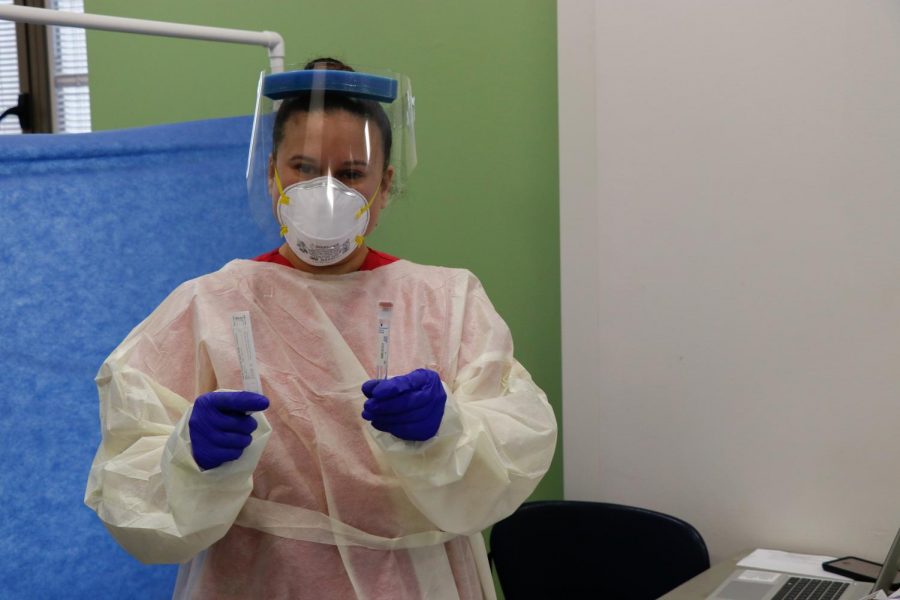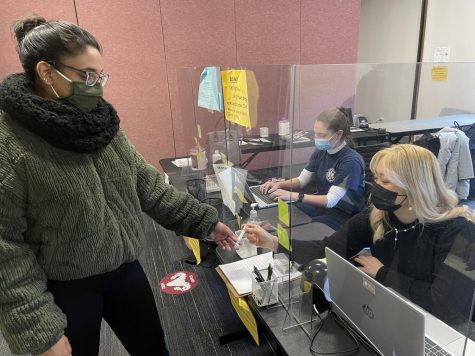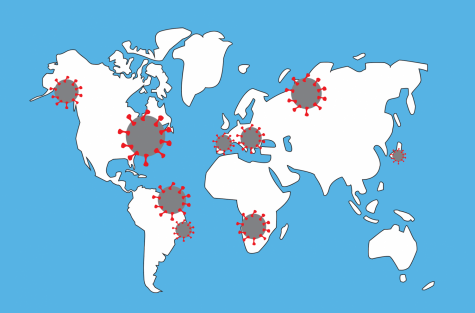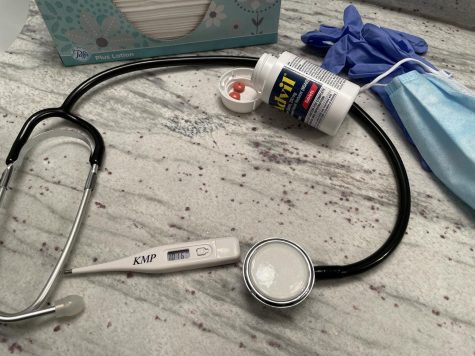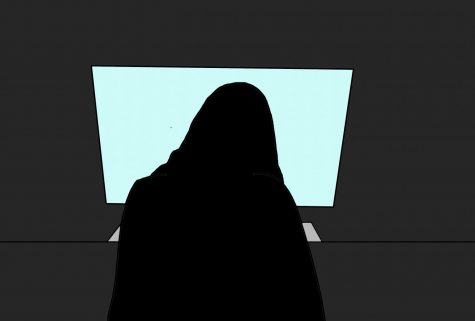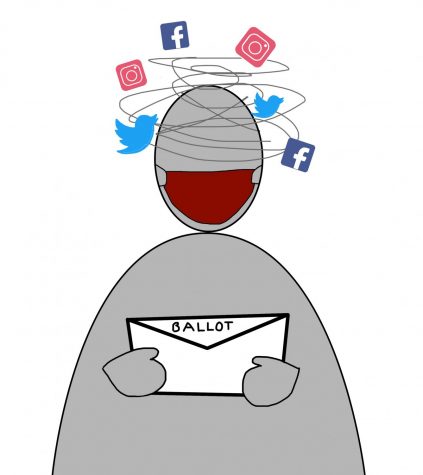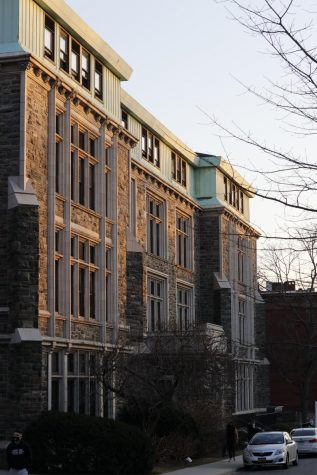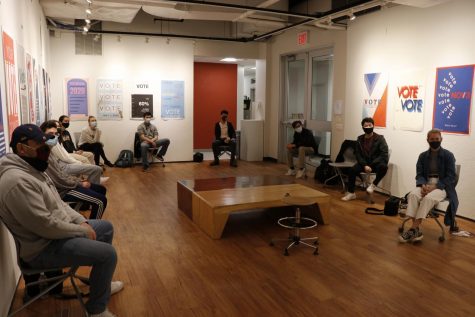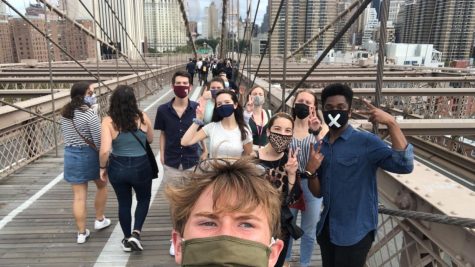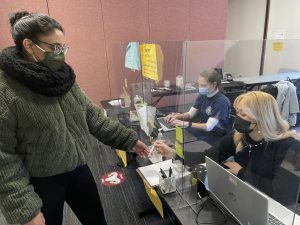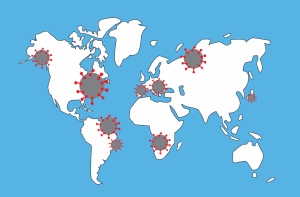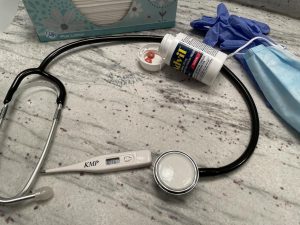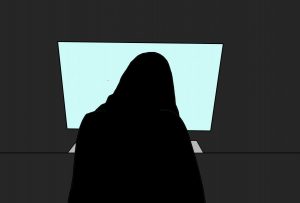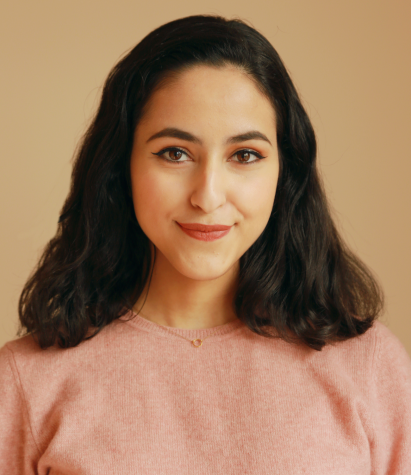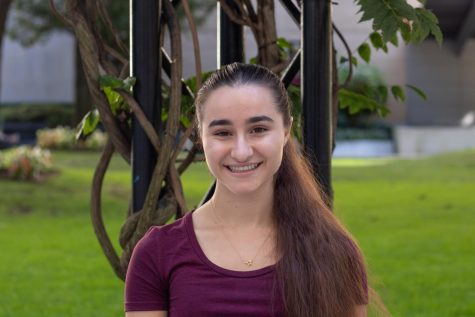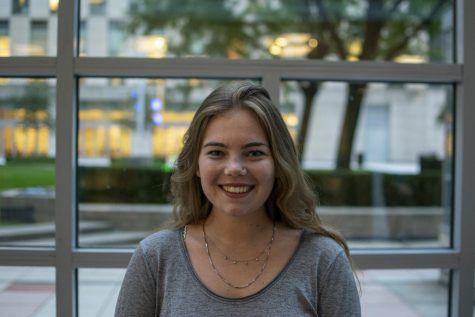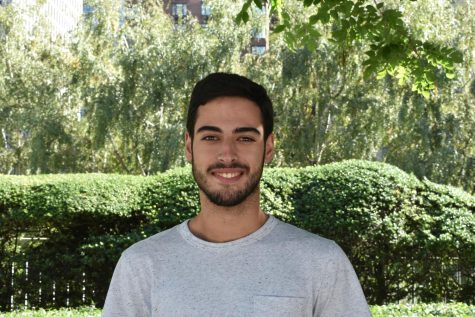Reflecting On a Year of COVID-19
Fordham students share their pandemic experiences one year later
Melissa Quiroz, University Health Services Office Nurse Manager, has been working hard with her staff and FUEMS members to effectively COVID-19 test the Fordham community while people returned to campus.
March 18, 2021
In the spring of 2020, Rachana Komatireddy, Fordham College at Lincoln Center (FCLC) ’22, said she was just starting to settle into her new role as chair of operations for the United Student Government (USG) at Fordham.
She used to wake up early in the morning to give herself enough time to walk to her classes for the day. After class, she would walk through the Lowenstein Center hallways and randomly bump into a friend, which “would turn into a 40-minute conversation,” she said.
Eventually, she made it back to her dorm room and saw her roommates, whom she described as her closest friends at the time, and they would talk about their days together.
“It shook me in a way that made me realize that nothing is permanent. I can’t plan for anything.” Trina Stewart, FCLC ’23
“I remember zooming through Argo to get to the USG office because I’d always be trying to get to a meeting on time,” she said. “Sometimes you accidentally run into someone randomly on the street and you’re like, ‘OK, let’s go grab lunch together.’” Journeying through her days, she remembered that there were a lot of opportunities for interactions and spontaneity.
Now, in the spring of 2021, her days, like those of all members of the Fordham community, are spent completely differently — and not just because of the amount of hand sanitizer she now uses, Komatireddy said.
The Early Days and Initial Impact of the Crisis
On March 1, 2020, the first case of coronavirus was confirmed in New York City. By March 7, there were 11 total cases in the city — 76 in New York state — leading Gov. Andrew Cuomo to declare a state of emergency to contain the spread of the virus.
Two days later, on March 9, Fordham canceled all face-to-face classes with the intent to resume on March 30. However, when then-President Donald Trump declared a state of emergency in the U.S. on March 13, Fordham made the decision to send students home for the remainder of the semester, forcing the entire community to adjust to an unprecedented new normal.
The abrupt close to the semester sparked a move-out dilemma for many students still on campus. Kamila Vahidi, FCLC ’23, was taking a walk when she received a Fordham email urging students to travel home as the danger of the coronavirus increased. Vahidi packed a small suitcase, thinking she would only be away for a short period, and traveled back to her home in Portland, Oregon.
Similar to many other students at Fordham, her items remained in her dorm room for a few months before she could return to New York for retrieval.
Trina Stewart, FCLC ’23, was similarly uprooted in March and continued to experience the effects of the pandemic both personally and on a familial level.
“It’s weird to think now that we flew home — no masks — people were like, ‘Oh, it’s just the flu.’” Joseph VanGostein, GSBLC ’22
“My dad lost his job for a few months and we almost had to move house. I would have had to leave Fordham. It shook me in a way that made me realize that nothing is permanent. I can’t plan for anything,” Stewart said.
Joseph VanGostein, Gabelli School of Business at Lincoln Center (GSBLC) ’22, was studying abroad at the Fordham London Centre when he received an email from the London staff informing students they should book flights to return to the U.S. as soon as possible.
Like many students at the time, VanGostein didn’t realize the seriousness of the virus a year ago. He said that he and his friends were still anticipating spending their spring break traveling around Europe. Even his professors weren’t convinced that abroad students should go home early.
“It’s weird to think now that we flew home — no masks — people were like, ‘Oh, it’s just the flu,’” he said.
By the end of March, New York City was in a state of lockdown under Cuomo’s executive order PAUSE. Coronavirus cases in New York City were surging, with 5,143 new reported cases on March 31.
Online Classes
As students moved back to their home states, international students traveled across countries to quarantine with their families. Some Fordham students were left with no choice but to take online classes from vastly different time zones.
Komatireddy flew back to India before its shutdown on March 24 and spent most of her quarantine there with her parents and sister.
“For the first couple of months, we were quite literally not allowed to leave.” Rachana Komatireddy, FCLC ’22
“For the first couple of months, we were quite literally not allowed to leave,” she said. Her only contact with her friends from school was a group chat she was in, which was a big contrast to the experience of being on campus and seeing her friends every day.
India Standard Time (IST) is 9.5 hours ahead of EST, which was a significant problem for Komatireddy during the spring 2020 semester when two of her classes ran from 1:30-2:45 a.m. and 3:30-6:15 a.m. IST.
“I definitely had to restructure the way that I lived when I was in India,” Komatireddy said.
While Komatireddy was able to return to campus in the fall of 2020, there were still many students who felt unsafe and chose to stay at home. By now, they have been taking classes from across the country or the world for over a year.
For these students, their college experience has completely changed — their parents have become their roommates, and their childhood bedrooms are their offices.
Sydney Costales, FCLC ’21, originally quarantined with her family in Hawaii. Now, she is spending her senior year in San Diego and has not returned to campus since March 2020.
“I expected to spend all of senior and junior year in NYC and I’m not getting my degree the way I expected.” Sydney Costales, FCLC ’21
Costales said that taking classes via Zoom has been chaotic and stressful, especially given the time difference between San Diego and New York.
“I expected to spend all of senior and junior year in NYC and I’m not getting my degree the way I expected,” she said. “I won’t be returning to campus and I probably won’t be attending the hybrid graduation either.” However, Costales is hopeful and acknowledged that things could be worse than living in San Diego. “I am getting my degree, which is what I came to college for,” she said.
For others, the transition to online learning has been more taxing. David Hernandez, GSBLC ’21, said that learning in a virtual setting negatively impacted his mental health.
“Two years ago, if you had asked me if I ever wanted to finish college, I would have said ‘No! Please give me another four years,’ but now I’m just desperate for it to end.” David Hernandez, GSBLC ’21
“Learning online is just not a conducive method for me to learn,” he said. Hernandez was studying abroad at Freie Universität in Berlin, Germany, during the spring 2020 semester. When classes were moved online, he said that his professors at Freie were much more lenient and understanding in comparison to his professors at Fordham.
“I really feel like (being online) affected my learning experience a lot, and I was in a very bad place last semester,” he said.
“Two years ago, if you had asked me if I ever wanted to finish college, I would have said ‘No! Please give me another four years,’ but now I’m just desperate for it to end,” Hernandez said.
Neither Costales nor Hernadez has taken any in-person classes or returned to campus in the past year.
A Year Later on Campus
Fordham students were not able to return to campus until the fall 2020 semester — five months after they were first sent home. For those who did return to campus, daily life became dramatically different, as students have had to wear masks, get tested for COVID-19 and social distance.
“I might live in the same building that I lived in a year ago, but it’s very different,” Komatireddy said.
Komatireddy currently lives on campus, but she has continued to take classes online. She said she spends a lot more time inside, especially in front of her computer screen.
“Why pay thousands of dollars for housing in the city when you know you can’t experience any part of it?” Kamila Vahidi, FCLC ’23
VanGostein returned to campus for the spring 2021 semester after taking classes remotely at his parents’ house on Long Island for the spring and fall 2020 semesters.
He said he was surprised when he walked through McMahon Hall for the first time in almost a year and did not have to wait for an elevator to arrive.
“It’s convenient, but also very sad because it kind of takes away from the liveliness,” VanGostein said.
Vahidi also decided to return to campus for the fall 2020 semester. Although she said she enjoyed the social aspect of living with her roommates, living at home was more cost-effective and beneficial to her mental health. She is taking classes remotely from Portland for the spring 2021 semester.
“Why pay thousands of dollars for housing in the city when you know you can’t experience any part of it? I thought it would be stabilizing to go back to the city … but it almost made it worse to try and create something that was gone,” she said.
“I used to get really anxious, leaving the dorm. It got to a point where I just did not want to leave the dorm anymore, just because I was so in my head about everything,” Vahidi continued.
“I feel like the pandemic has made a lot of us mature a lot faster.” Joseph VanGostein, GSBLC ’22
She noted that living at home in a more secluded area has eased her concerns about contracting and spreading the virus. The pandemic had also affected her academic performance, which faced a more significant decline on campus rather than at home during the current semester.
Stewart also took note of significant changes that occurred in her life over the past year, specifically that she gained and ended friendships, changed her major, and started a new job. Similar to Vahidi, her academic performance prior to the pandemic was significantly stronger; she said she is currently focusing more of her energy on internships.
Looking Toward the Future
Planning for the future took on a new level of difficulty as many of the events and programs that Fordham students anticipated were canceled. The university’s commencement ceremonies, study abroad programs and upcoming internships were all put on pause.
When VanGostein’s plans for spring break and a summer internship in Washington, D.C., were canceled in 2020, he thought it was “the worst thing to ever happen.” However, he quickly came to realize how fortunate he actually was.
VanGostein said his biggest connection to the pandemic has been through his mom, who works as a nurse on Long Island. At the start of the pandemic, he saw the effect that the rising death toll in New York had on her.
“I feel like the pandemic has made a lot of us mature a lot faster,” he said.
VanGostein said it has been inspiring to see the growth many Fordham students have had over the past year. Spending time in quarantine has led many students to pick up unique hobbies and skills to diversify their interests.
“I don’t get to know everything, I don’t get to have all the answers, and I have to be okay with that.” Rachana Komatireddy, FCLC ’22
In his own life, VanGostein took the steps to invest in his future. He studied for the LSATs over the summer and took the test during the fall 2020 semester, which was previously only a far-out goal.
Komatireddy was used to planning out her life in detail, but when the pandemic disrupted her normalcy, she had to learn how to become comfortable with the unknown.
Now she tries to make herself more aware of the present moment and not get caught up in the things she doesn’t have control over. Other than studying, doing her USG work and calling her mom every other day, she tries to refrain from thinking beyond those day-to-day tasks.
“I don’t get to know everything, I don’t get to have all the answers, and I have to be okay with that,” she said. “In fact, it’s honestly kind of a nice thing.”
Though it has been a year since the pandemic began and there have been multiple phases of the vaccine rollout, the effects of COVID-19 still remain prevalent in people’s lives. The “return to normalcy” most people are waiting for does not have a set date, but lifestyle adjustments have been and are currently being made to accommodate the situation at hand and to prepare for a future in which COVID-19 no longer poses a direct threat.

